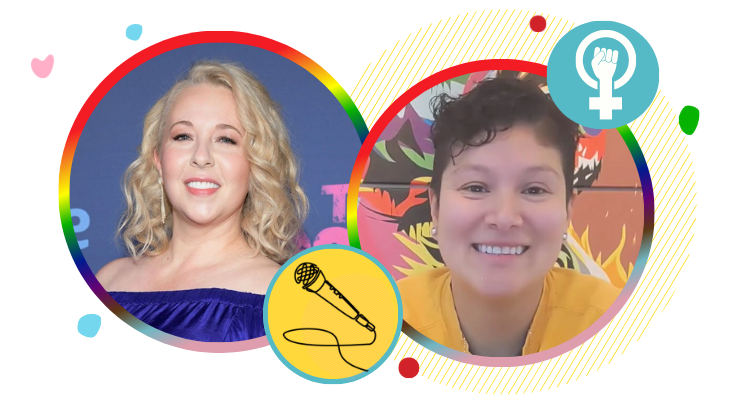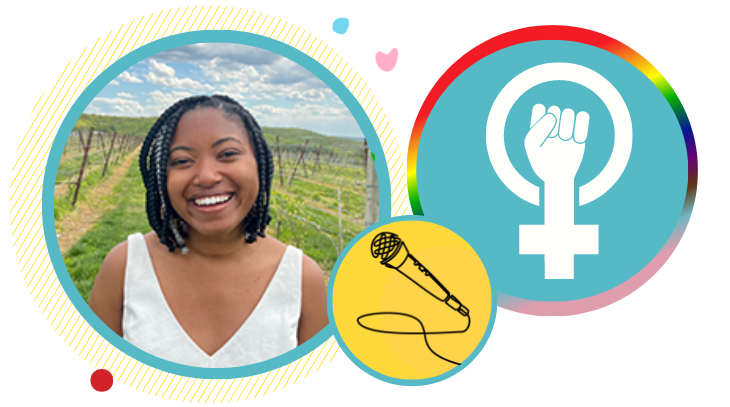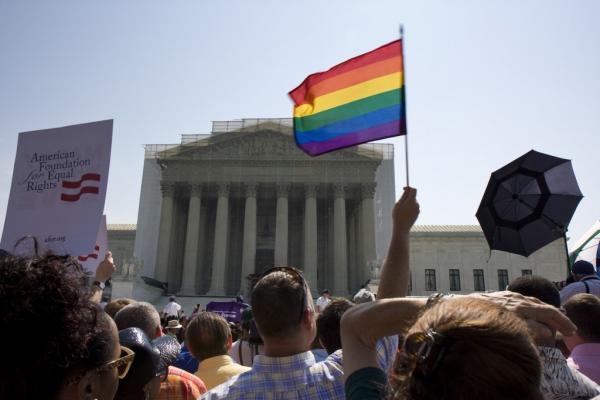Inspiring Inclusion this Women's History Month
Created by activists over 100 years ago, International Women’s Day not only honors the work women have done to fight for our collective liberation but also serves as a call to action for the next generation to push even harder for an equitable future.
This year’s International Women’s Day theme is #InspiringInclusion, and Point is spotlighting women who inspire inclusion in their daily lives. At Point Foundation, we see equity as the fair treatment and advancement of all people while embracing varied backgrounds, identities, expressions, viewpoints, and experiences. For many Point Scholars, inspiring inclusion means incorporating the principles of intersectional feminism, which focuses on women experiencing overlapping, concurrent forms of inequity.
What is intersectional feminism?
For many Point Scholars, inspiring inclusion means incorporating the principles of intersectional feminism. Intersectional feminism is a form of activism that recognizes the different obstacles impacting women’s lived experiences. This concept acknowledges most women are living through multiple forms of bigotry. For example, Black women may experience racism and misogyny as they navigate the world while trans women may be dealing with both transphobia and misogyny in their daily lives.
"…unfortunately even within the community of LGBTQ women, there are some people who believe that some of us can access that freedom and equality without it being true for all of us," said Point Scholar Dasia Moore. "A world that is equal and free for queer women would have to include a world that does not show disproportionate violence towards trans women, that doesn’t disproportionately incarcerate Black and brown LGBTQ women. So really liberation for all of us is the goal and it's definitely one that we're still working towards."
Some of the overlapping oppressions that intersectional feminism considers are misogyny, racism, heterosexism, transphobia, ableism, ageism, xenophobia, and classism. Addressing the many barriers standing between all LGBTQ women and success is necessary to embracing equity in 2024.
Intersectional feminism requires that organizations create services and resources for people from a multitude of racial backgrounds, religions, ethnicities, and economic status. Point Scholar Jaspreet Kaur appreciates how Point centers curiosity around difference and celebrates our differences as a way to bring us all closer together.
Inspiring Inclusion in our communities
Inclusion is about creating programs like Lesbians Who Tech & Allies, a program that gives LGBTQ women across the country the resources they need to confront and end misogyny, homophobia and transphobia, and racism in the workplace. Alumni like Angie Gonzalez, who graduated from NYU in 2018 with a degree in Electrical Engineering and Physics, have helped ensure the next generation has the resources they need to embrace equity in the tech sector. Reflecting on her experience, Angie wrote:
“The Lesbians Who Tech Summit was the first of its kind that I’ve attended and I’ve never felt more inspired, safe, and empowered in a STEM environment in my life,” Angie said. “To see all of the amazing women present on hot topics in the STEM community, about their work, or about how their companies have become more diverse and inclusive really gave me a sense of belonging in the STEM field - something I have been struggling to find throughout my time at NYU.”
Read Angie's reflections on her experiences as a racially marginalized LGBTQ woman in STEM.
Gender Inequality in the Workplace
Embracing gender equity requires we ensure women have the protections they need to pursue safe and secure work across all income levels.
At the very top of the economic ladder, there are LGBTQ women like Beth Ford, who became the first out lesbian to serve as a Fortune 500 CEO in 2018, and Sue Y. Nabi, who became the first out trans woman to serve as a Fortune 500 CEO in 2020. In the lower socioeconomic groups are women who engage in survival sex work around the world. Although sex work is a $99 billion industry globally and women make up over 80% of all sex workers, criminalization and unsafe work conditions make the industry difficult for women to navigate and survive.
For years, Point BIPOC Alum Lakeesha Harris has been working to decriminalize sex work throughout Louisiana and is now pursuing a graduate degree in political science at Northeastern Illinois University. Lakeesha is the former Director of Reproductive Health and Justice at Women With A Vision, Inc, and worked with Louisiana’s Representative Mandie Landy to create the first comprehensive statewide bill in the nation to decriminalize sex work. With current and former sex workers, she developed the Deep South Decrim campaign to educate the community on what it means when sex workers are targeted and criminalized. In 2021, she joined a group of 119 sex workers and allies provided three hours of testimony in the Louisiana House – a first in any statehouse. Although Representative Landy’s bill did not make it to a vote, she and Lakeesha continue to work towards the decriminalization of sex work and the protection of women across Louisiana.
Spotlighting Women Scholars throughout Women's History Month
Point Scholars are breaking barriers for representation, paving paths to inclusion, and creating ways to embrace equity in the workplace, across communities, and on a global level. Be sure to join our mailing list to learn more about the specific ways the women of Point are changing the world today.
Related Posts
March 23, 2023, Point Foundation - The National LGBTQ Scholarship Fund

LGBTQ Women and Media Representation
LGBTQ representation on US television is at an all-time high, according to a GLAAD study. In 2022,...
March 10, 2023, Point Foundation - The National LGBTQ Scholarship Fund

A Tradition of Black LGBTQ Women Creators
Although she is currently pursuing an MFA in Poetry at New York University, Point Foundation...
August 11, 2014, teampoint

Topical Talk: Point Scholars comment on New York Times article, “Justices’ Rulings Advance Gays; Women Less So.”
Credit Photo Phiend / Flickr-Creative Commons As reported in a front page feature of the August 4,...